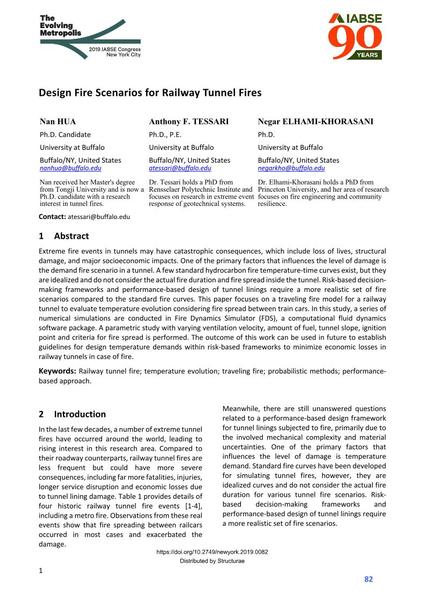Design Fire Scenarios for Railway Tunnel Fires

|
|
|||||||||||
Bibliografische Angaben
| Autor(en): |
Nan Hua
(University at Buffalo)
Anthony F. Tessari (University at Buffalo) Negar Elhami-Khorasani (University at Buffalo) |
||||
|---|---|---|---|---|---|
| Medium: | Tagungsbeitrag | ||||
| Sprache(n): | Englisch | ||||
| Tagung: | IABSE Congress: The Evolving Metropolis, New York, NY, USA, 4-6 September 2019 | ||||
| Veröffentlicht in: | The Evolving Metropolis | ||||
|
|||||
| Seite(n): | 82-86 | ||||
| Anzahl der Seiten (im PDF): | 5 | ||||
| DOI: | 10.2749/newyork.2019.0082 | ||||
| Abstrakt: |
Extreme fire events in tunnels may have catastrophic consequences, which include loss of lives, structural damage, and major socioeconomic impacts. One of the primary factors that influences the level of damage is the demand fire scenario in a tunnel. A few standard hydrocarbon fire temperature-time curves exist, but they are idealized and do not consider the actual fire duration and fire spread inside the tunnel. Risk-based decision-making frameworks and performance-based design of tunnel linings require a more realistic set of fire scenarios compared to the standard fire curves. This paper focuses on a traveling fire model for a railway tunnel to evaluate temperature evolution considering fire spread between train cars. In this study, a series of numerical simulations are conducted in Fire Dynamics Simulator (FDS), a computational fluid dynamics software package. A parametric study with varying ventilation velocity, amount of fuel, tunnel slope, ignition point and criteria for fire spread is performed. The outcome of this work can be used in future to establish guidelines for design temperature demands within risk-based frameworks to minimize economic losses in railway tunnels in case of fire. |
||||
| Stichwörter: |
probabilistische Methoden
|
||||
